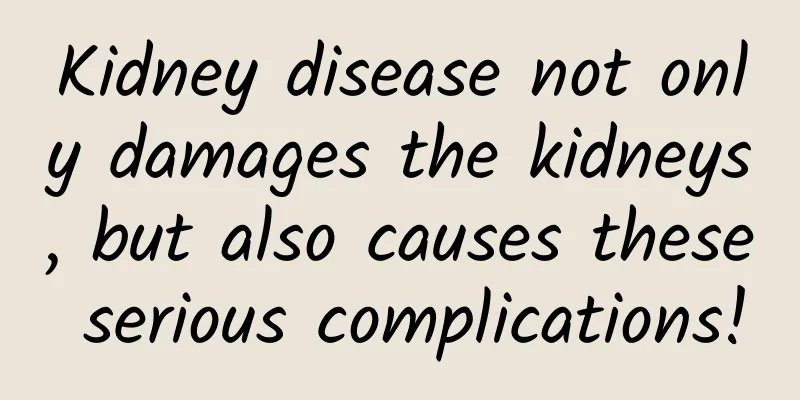Kidney disease not only damages the kidneys, but also causes these serious complications!

|
When people talk about kidney disease, they often first think of the lesions of the kidney itself, such as proteinuria, hematuria, decreased renal function, etc. However, the harm of kidney disease is far more than just the kidneys. It is like a time bomb hidden inside the body, which can cause a series of serious complications, cause a huge impact on multiple systems of the body, and greatly affect the patient's quality of life and health. 1. Complications of the cardiovascular system 1. Hypertension : Hypertension is one of the most common complications of kidney disease. The kidneys play a key role in regulating blood pressure. When kidney function is impaired, the water-sodium balance in the body is disturbed, and the renin-angiotensin-aldosterone system (RAAS) is activated, leading to vasoconstriction and increased blood volume, which in turn causes hypertension. Long-term hypertension will in turn aggravate kidney damage, forming a vicious cycle. Hypertension will increase the burden on the heart, cause heart hypertrophy, and increase the risk of cardiovascular diseases such as coronary heart disease and heart failure. According to statistics, about 70% - 80% of chronic kidney disease patients will have hypertension. 2. Coronary heart disease : The risk of coronary heart disease in patients with kidney disease is significantly higher than that of normal people. In addition to the influence of high blood pressure, patients with kidney disease often have lipid metabolism disorders, with elevated lipid components such as cholesterol and triglycerides in the blood. At the same time, inflammatory response and oxidative stress will also increase. These factors will lead to the occurrence and development of atherosclerosis, causing coronary artery stenosis, insufficient blood supply to the myocardium, and coronary heart disease. Patients may experience symptoms such as chest pain, chest tightness, and palpitations, which may lead to myocardial infarction and endanger life in severe cases. 3. Heart failure : As kidney disease progresses, renal function gradually declines, water and sodium retention in the body worsens, blood volume continues to increase, and the heart needs to bear greater pressure to pump blood. At the same time, factors such as hypertension and anemia will further damage heart function and eventually lead to heart failure. Patients with heart failure will experience symptoms such as dyspnea, fatigue, edema, and a serious decline in quality of life, with a poor prognosis. 2. Hematologic Complications 1. Renal anemia : The kidneys can secrete erythropoietin, a hormone that stimulates bone marrow hematopoiesis and promotes the production of red blood cells. When kidney function is impaired, the secretion of erythropoietin decreases, leading to insufficient red blood cell production, which in turn causes renal anemia. In addition, kidney disease patients may also have deficiencies in hematopoietic raw materials such as iron, folic acid, and vitamin B12, as well as factors such as shortened red blood cell lifespan, which further aggravate the degree of anemia. Anemia can cause patients to have symptoms such as pale complexion, fatigue, dizziness, and palpitations, affecting the normal functions of various organs and systems in the body. 2. Bleeding tendency : The platelet function and coagulation mechanism of kidney disease patients may be abnormal, leading to an increased bleeding tendency. This is because when kidney function is impaired, toxins accumulate in the body, which will affect the adhesion, aggregation and release functions of platelets. At the same time, the activity of coagulation factors may also be affected. Patients may experience symptoms such as skin ecchymosis, nosebleeds, gum bleeding, menorrhagia, etc. In severe cases, it may lead to internal bleeding and endanger life. 3. Complications of the skeletal system 1. Renal osteodystrophy : also known as renal osteodystrophy, it is one of the common complications of chronic kidney disease. Due to impaired kidney function, calcium and phosphorus metabolism disorders in the body, hyperparathyroidism, and abnormal bone metabolism and structure. Patients may experience symptoms such as bone pain, fractures, and bone deformities, which seriously affect their quality of life. The occurrence of renal osteodystrophy is related to many factors, such as abnormal vitamin D metabolism, increased calcium-phosphorus product, and increased parathyroid hormone secretion. Early diagnosis and treatment are essential to prevent and delay the progression of renal osteodystrophy. 2. Osteoporosis : Kidney disease patients are prone to osteoporosis due to calcium and phosphorus metabolism disorders, vitamin D deficiency, long-term use of glucocorticoids, etc. Osteoporosis can reduce bone density, weaken bone strength, and increase the risk of fractures. In daily life, even slight external forces such as coughing and turning over can cause fractures. Therefore, kidney disease patients need to pay attention to calcium and vitamin D supplements, and engage in appropriate outdoor activities to prevent the occurrence of osteoporosis. 4. Neurological complications 1. Peripheral neuropathy : Chronic kidney disease patients may experience peripheral neuropathy, which manifests as numbness, tingling, paresthesia and other symptoms. This is due to the accumulation of toxins in the body, which damages the peripheral nerves. Peripheral neuropathy affects the patient's daily life and mobility, and reduces the quality of life. In addition, patients may also experience symptoms such as muscle weakness and muscle atrophy. 2. Central nervous system complications : In the late stage of kidney disease, especially in the uremia stage, patients may experience central nervous system complications such as headache, dizziness, insomnia, memory loss, mental abnormalities, etc. This is because toxins in the body cannot be discharged in time and accumulate in the blood, affecting the normal function of the central nervous system. In severe cases, patients may experience coma, convulsions and other symptoms, which are life-threatening. The complications caused by kidney disease involve multiple systems of the body, posing a serious threat to the health of patients. Therefore, for patients with kidney disease, early diagnosis, active treatment of kidney disease, controlling the progression of the disease, paying close attention to the occurrence of complications, and taking effective preventive and therapeutic measures in a timely manner are the keys to improving the quality of life and prolonging life. In daily life, patients should follow the doctor's advice, eat a reasonable diet, exercise moderately, have regular checkups, maintain a good attitude, and actively deal with the disease. |
<<: How can patients with kidney disease recover scientifically? Please keep this nursing guide!
Recommend
What causes abdominal pain before period?
For girls, they have a special period every month...
Do asparagus fern leaves need to be sprayed with water? What should be paid attention to when spraying asparagus fern leaves with water?
Asparagus fern is a plant that is often seen in l...
There is a hard lump next to the vulva
The female genitals are the most private area. So...
Postmenopausal bleeding? Beware that "old age bleeding" is not "inverted flowering"
Mrs. Li, who is over 70 years old, had menopause ...
What to do about dry skin during menopause?
When women reach menopause, they will experience ...
What is the three-level prevention of myopia?
The prevention and control of myopia among childr...
Why does a pregnant woman have a bitter mouth?
I believe many friends have experienced a bitter ...
Unconsciously diagnosed with diabetes? You need to know these early symptoms!
Diabetes is a relatively common disease. There ar...
What are the benefits of swimming for girls?
In the hot summer, many people like to go swimmin...
Women have many pain points during menstruation, these methods can help you eliminate them all!
Generally speaking, most women will experience so...
What is the difference between a clothes dryer and a dryer? The principle of a dryer
In our lives, the use of dryers is becoming more ...
What does an edible lily look like? How to remove the bitter taste of lily?
Lily is very common in our daily life. Many peopl...
What not to eat during menstruation
In daily life, many girls don’t know much about m...
People who don't get sick for a long time have poor immunity and are more likely to get cancer? The truth is here
Review expert: Peng Guoqiu, deputy chief physicia...









